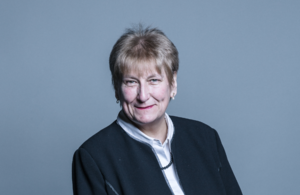Vital discussions on the importance of chemical weapon demilitarisation began on 2 November, with Defence Minister Baroness Goldie delivering a keynote speech.

Photograph of Baroness Goldie made available by UK Parliament under an Attribution 3.0 Unported (CC BY 3.0) licence.
Hosted by the Ministry of Defence and the Defence Science and Technology Laboratory (Dstl), the Chemical Weapons Demilitarisation (CWD) Conference has been held every year since 1998 (except 2020), shortly after the Chemical Weapons Convention entered into force, banning chemical weapons and requiring states to destroy any existing stockpiles.
With over 98% of the world’s declared chemical weapon stocks now destroyed, the Conference provides an opportunity for experts from all over the world to discuss their
progress and co-operation in eliminating chemical weapons and addressing the remaining challenges, and to share experiences and lessons.In her keynote speech to the Conference, Defence Minister Baroness Goldie commended the vital work of scientific and technical experts to make the world safe from chemical weapons. The Minister also acknowledged the continued threat from the use of chemical weapons, including in Syria, Russia and Salisbury, and the need for those responsible to be held to account.
Defence Minister Baroness Goldie said:
I am very pleased the Ministry of Defence and Dstl have hosted the Chemical Weapons Demilitarisation Conference, bringing together experts from Defence, industry and academia to strengthen the implementation of the Chemical Weapons Convention.
The use of chemical weapons shows there is still much to do before we reach our goal. The UK is determined to uphold the international resolve against the use of chemical weapons. We remain firm in our determination to hold to account those who continue to use chemical weapons.
Welcoming to the Conference Ambassador Fernando Arias, Director General of the Organisation for the Prohibition of Chemical Weapons, Baroness Goldie added:
I congratulate and thank Director General Fernando Arias and the Technical Secretariat of the Organisation for the Prohibition of Chemical Weapons for their unwavering commitment and continuing determined and professional efforts to implement the Convention effectively and impartially. You bear unique responsibilities, on behalf of the international community, for achieving the objectives of the Chemical Weapons Convention and we acknowledge the critical importance of your role.
More than 70,000 tonnes of chemical weapon agents and millions of bombs, rocket warheads and artillery shells have been destroyed since 1998, but technical challenges remain. Chemical weapon attacks, including on Alexey Navalny in Russia in August last year, in Salisbury in the UK in 2018 and the numerous chemical weapon attacks by the Assad regime in Syria, make it clear the Convention requires global cooperation to affect lasting change.
OPCW Director General Fernando Arias said:
The complete elimination of the possibility of the use of chemical weapons is at the core of the Chemical Weapons Convention – there are no exceptions, it is absolute in its scope. Despite the achievement since the Convention’s entry into force 24 years ago, the use of chemical weapons in Iraq, Malaysia, the Syrian Arab Republic, the Russian Federation and the United Kingdom demonstrate that these weapons remain an insidious threat.
Our world today is very different from the one in 1997, when the OPCW was founded. To meet challenges, it is imperative for us to keep adapting and evolving in an ever-changing global landscape. The OPCW Centre for Chemistry and Technology, or ChemTech Centre, which is now under construction close to The Hague, will be an integral part of our effort to better implement the Convention.
Preventing re-emergence of chemical weapons will require the commitment and efforts of all stakeholders: governments, industry and civil society. You can count on the Secretariat of the OPCW to continue working with all States Parties to uphold and reinforce the norm against the use of chemical weapons.
Dstl interim chief executive Doug Umbers said:
Recent events have again shown the importance of science and technology in countering chemical weapons. Dstl is proud to play a leading role in organising the conference on behalf of the international community.
Dstl continues to support the aim of having a Designated Laboratory such as our own in every continent, so that this high level of technical expertise is widely available to support the OPCW. The UK has provided voluntary funding to the OPCW to support this objective, working particularly with colleagues in Africa, Latin America and the Caribbean. It is therefore encouraging to see that Brazil has recently achieved the accolade. This brings us one step closer to achieving a future free from chemical weapons.

No comments:
Post a Comment